|
 Is Email Marketing..... Is Email Marketing.....

I've
had a few things happen recently that I found instructive.....
 I
had to get some new ink cartridges for my printer. I went to a
major, nation-wide office supply store, and at the checkout the young lady
behind the counter informed me that if I signed up for a free store
discount card that I would get an instant 10% discount of my purchase that
day. In filling out the little application, I found that, in
addition to my name, address, and phone number, they also requested my
email address. I
had to get some new ink cartridges for my printer. I went to a
major, nation-wide office supply store, and at the checkout the young lady
behind the counter informed me that if I signed up for a free store
discount card that I would get an instant 10% discount of my purchase that
day. In filling out the little application, I found that, in
addition to my name, address, and phone number, they also requested my
email address.
 Last
weekend, at Sears, while finalizing my purchase for some shirts, the clerk
asked me for my email address so she could add it to my information
in their computer database. Last
weekend, at Sears, while finalizing my purchase for some shirts, the clerk
asked me for my email address so she could add it to my information
in their computer database.
 A
few months ago I bought a new car at my local Toyota dealer. In
filling out the reams of paperwork, my
email address was one of
the many items they asked for. A
few months ago I bought a new car at my local Toyota dealer. In
filling out the reams of paperwork, my
email address was one of
the many items they asked for.
 Upon
purchasing my last computer at Best Buy earlier this year, my
email address was one of the (non-optional) items of information I was
required to supply. Upon
purchasing my last computer at Best Buy earlier this year, my
email address was one of the (non-optional) items of information I was
required to supply.
 When
I recently signed up for my "Discount Membership Card" at the
local Sheetz Kwik Shopper (I get every tenth cup of coffee free and 3
cents off each gallon of gas -WHOOPEE!) they wanted my email address. When
I recently signed up for my "Discount Membership Card" at the
local Sheetz Kwik Shopper (I get every tenth cup of coffee free and 3
cents off each gallon of gas -WHOOPEE!) they wanted my email address.
 Last
night I ordered a pizza from Dominoes over the Internet (large,
meat-lovers). In addition to my name, address, credit card info, and
phone number, they also wanted - you guessed it - my email address. Last
night I ordered a pizza from Dominoes over the Internet (large,
meat-lovers). In addition to my name, address, credit card info, and
phone number, they also wanted - you guessed it - my email address.
The
same thing may have been happening to you, as well. Although it's so
common anymore you may not have even noticed it. And if you have
ordered virtually ANYTHING online you know you have to give 'em your email
address!
Most
retailers are now asking for your email address!
They
use this information to inform you of time-sensitive deals, specials, and
sales. It's a "standard operating procedure" anymore for
both brick-and-mortar and online stores to increase their sales withOUT you going
to the
store.
But
what I DON'T understand is this:
Although ALL of these merchants asked
me for my email address.....
.....not ONE
asked me
for my Twitter account
or my Facebook info!
And
yet.....
 When
I signed up for my Facebook account, they required my email address. When
I signed up for my Facebook account, they required my email address.
 When
I signed up for my Twitter account, they required my email address. When
I signed up for my Twitter account, they required my email address.
 When
I signed up for my LinkedIn account, they required my email address. When
I signed up for my LinkedIn account, they required my email address.
 When
I signed up for my Pinterest account, they required my email address. When
I signed up for my Pinterest account, they required my email address.
 When
I signed up for my Google+ account, they required my email address. When
I signed up for my Google+ account, they required my email address.
Are
you starting to see a pattern here?
If we are to believe the "next shiny thing" hawkers, email
marketing is dead - supposedly it's "social media" that is the wave of the future.
But, although ALL of the offline retailers required my email address,
NONE required my social media information! In fact ALL of the social
media sites required my email address in order to sign up for an account!
Does
anyone think that maybe, just MAYBE, these corporate giants know what the
really IMPORTANT information is for MARKETING PURPOSES - NOT the number of
"followers" we have, or the number of "likes" we have,
but that activity
that puts M-O-N-E-Y in our pockets!?
So, whatís going on? Is
email alive or dead? Let's just see.....
First of all, let me say
this: It's not really fair to try to compare Email Marketing with
Social Media Marketing.
It's like trying to compare apples to
oranges, or even apples to tennis balls. Email and Social Media are
two completely different animals meant to accomplish two completely
different things. However, as it is with ANY "bright, new shiny
thing" on the Internet, there will always be those fast-buck artists
that make unsubstantiated claims in order to sell that course about,
"How to Make A Million Dollars on Facebook," or "How to
Retire in Three Weeks with Twitter."
I know, I know - how dare
I have the audacity to hate on social media? Itís the way of the
future! It will solve world hunger! It will have your babies.!
And very soon, it will even
make your decaf soy latte in the morning. (LOL)
Donít get me wrong.
Social media is great, and it can be used in marketing.
Social media can be used to initiate communication and to begin the
process of email marketing. But it simply cannot REPLACE email marketing.
In fact, the reverse is true: the main thrust of social media
marketing is to capture email addresses! All other things being equal, email marketing still
crushes social media marketing. Here are 5 reasons why:
1. SIMPLE NUMBERS
Did you know that email
has nearly three times as many user accounts as Facebook and Twitter combined?
As of 2014, there
are nearly 3.9 billion email accounts worldwide, with that number
expected to increase to 4.9 billion by the end of 2017. (Source: The
Radicati Group)
As you can see by the chart
below, email useage has been steadily increasing in the last few years,
while Facebok and Twitter useage has nearly reached a stagnation point.
It's not hard to understand
why: When someone gets a computer, they MAY join Facebook or
Twitter, but the very first thing they ALL do is to..... SETUP AN
EMAIL ACCOUNT!

In fact, if you imagine a
full cup of rice is the number of emails sent every day, then by
comparison, all the daily posts on Facebook would make a miserable
10 grainsóbarely enough to pick up with a chopstick. And all the tweets
sent every day would be a measly 4 grains. In fact, Facebook and
Twitter combined make up just 0.2% of the number of emails sent each day.
(And the above numbers do
NOT even include include spam emails.)

By the same token, every
web search made on every search engine every day equals just
1/100th of daily email traffic; and all the pages viewed on the
entire web each dayóincluding images and videosóuse only a quarter of
the bandwidth consumed by email.
Many
marketers are so busy chasing the latest baubles and magic
bullets
that they havenít got a clue about all this!
After all, whatís old is
dead, right? So email, being older than dirt in internet terms, must be deader
than anything.
"No one uses it any
more" - you hear it being said or, more often, "I tried but it didnít
work."
But to SUCCESSFUL marketers,
email is not just essential to their business efforts, but foundational
to their marketing and sales systems.
Quality vs. Quantity
Okay, you may be thinking,
sure, email has heaps of users. Itís got major "traffic"
compared to social media channels. But so what? Itís not like traffic
alone means anything. A small amount of precisely-targeted marketing aimed
at high-quality traffic will nail much larger amounts than that of shotgun
pellets sprayed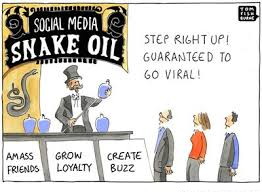 willy-nilly. willy-nilly.
Absolutely right. If
thatís what you were thinking, youíre well on your way to being a
better marketer than most "experts." So let me tell you the good
news:
.....email C-R-U-S-H-E-S social media for
quality of traffic as well
as quantity.
Hereís why:
2. EMAIL IS THE MOST PERSONAL
MEDIUM
"Oh," I
hear you muttering. "Facebook. Facebook is the more
personal, Stan."
No, no it ainít.
First of all, refer back to
item 1: simple numbers. A lot of people simply donít use Facebook.
But secondly, in the
vast majority of cases, business-minded people do not go to
Facebook for private, 1-on-1 conversations. (Maybe teenyboppers do,
and if youíre in that market niche and want to try marketing to them
using Facebookís private message feature, good luck with that.)
Business people like us, fellow Big Dogs, open Gmail or Outlook or whatever, and bang out an
email.
Email
is the first, best social media channel.
And that
is the power WE want to tap!
3. EMAIL IS THE MOST
"BUSINESSY" MEDIUM
Yes, some businesses do use
Facebook or Twitter or Google Plus for communicating with various people.
But when it comes to building business relationships and communicating
with partners and clients, the most "serious,"
"grown-up" medium is email.
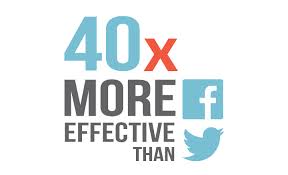 A recent study concluded
that email is almost 40 times better at acquiring new customers
than Facebook and Twitter. (Source: McKinsey
& Company) A recent study concluded
that email is almost 40 times better at acquiring new customers
than Facebook and Twitter. (Source: McKinsey
& Company)
44% of
consumers made at least one purchase last year based on a promotional
email they received. (Source: Convince
and Convert)
When asked
which medium consumers would like to receive updates from, 90% preferred
an email newsletter, while only 10% chose Facebook. (Source:
Nielsen
Norman Group)
Email
conversion rates are three times higher than social media, with a
17% higher value in the conversion. (Source: McKinsey
& Company)
48% of
consumers say that they prefer to communicate with brands via email.
(Source: Direct
Marketing News)
So the question Iíd like
to pose is simple: would you rather use a single marketing
channel to talk to all your customers in the most professional way
possibleÖor divide your energy between multiple different
channels to talk to only some of them in ways that donít have that
professional gloss?
(Now remember, Iím not
saying you shouldnít use those other channels. Just that you shouldnít
use them before email. Hereís another reason why not:)
4. EMAIL GETS WAY
MORE ATTENTION PER CUSTOMER THAN ANYTHING ELSE
Very simply, youíre more
likely to get "face time" with your prospects if you use email.
This isnít necessarily because your customers spend more time with email
than on Facebook or searching Google or whatever - although they might.
Rather, itís because
email allows you to make repeated contact, and that contact is
ďinvasiveĒ. Itís in their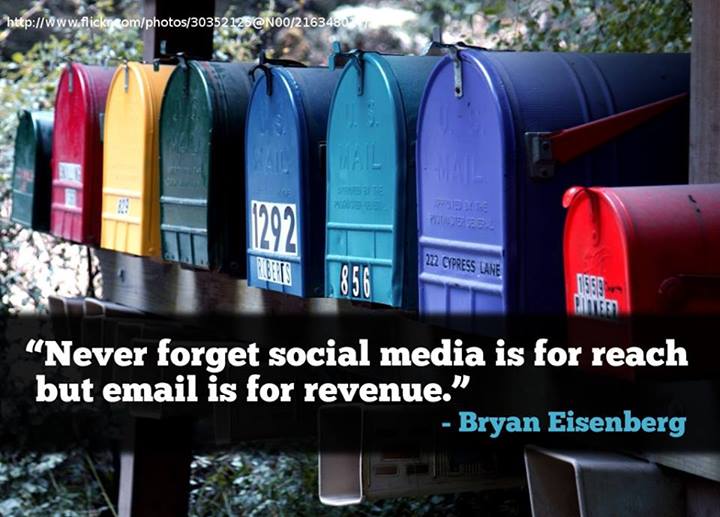 mailbox
- their inner electronic sanctum.
Thatís very different from sending out a tweet or posting something on
Facebook, where they may or may not see it, because itís just part of a
much larger timeline featuring hundreds of other people. mailbox
- their inner electronic sanctum.
Thatís very different from sending out a tweet or posting something on
Facebook, where they may or may not see it, because itís just part of a
much larger timeline featuring hundreds of other people.
In that situation, youíre
easily missed if you donít hit just the right window (which often
differs per person).
But in even the most
badly-managed inbox, your message is still there, waiting for their
attention. It doesnít just go away.
So provided you say things
worth reading, your customers will give you minutes of a time each day.
Minutes are like dog years on the internet.
And the more worth reading
you are, the more your customers actually start to look forward to your
messages. Indeed, research shows that most people open email from a
maximum of 16 "trusted advisers" - and they almost always open
these emails. If you can get into this inner circle, you get undivided
attention.
5. EMAIL IS A
"TRANSACTIONAL" MEDIUM
What I mean by this is
simply that customers already expect to get offers by email,
and to buy things through email. So they not only have a high tolerance
for offers, but theyíre actually more likely to be in a buying frame of
mind. Theyíre primed.
 For every $1
spent on email marketing, the average return is $44.25. (Source: emailexpert) For every $1
spent on email marketing, the average return is $44.25. (Source: emailexpert)
AND,,,,, When marketed
through email, consumers spend 138% more than people who donít receive
email offers. (Source: Convince
and Convert)
Compare this to Facebook,
where your customers are really just there to chat with their friends, see
the latest cute cat videos, and play Farmville. Even if they like
you, thatís a lousy environment for marketing isnít it? Or Twitter,
where people are in the habit of finding interesting things to share, or
catch up with the people they follow - but very seldom are looking to buy
anything.
With email, you can "train" your customers to expect offers while simultaneously teaching
them about your value, day in and day out. This means they begin to not
only expect offers from you, but to desire them (at least some of them).
And because of the ability to make effectively unlimited contacts, you are
infinitely more likely to catch them at time when theyíre ready
to buy (which is one of the most important rules of sales).
To summarize, email simply
has the nut hand at the marketing poker table.
Facebook and Twitter are
channels used by far fewer customers, for frivolous, non-business and
non-transactional things. Marketing messages get less attention per
customer than email, and they fail to establish as personal a connection
either.
*
* *
Here are the top Most Popular Social Networking Sites as derived from our eBizMBA
Rank which is a continually updated average of each website's
Alexa Global Traffic Rank, and U.S. Traffic Rank from
both Compete and Quantcast.
 1 | Facebook 1.6 billion
registered users - 1.35 billion active users
1 | Facebook 1.6 billion
registered users - 1.35 billion active users
 2 | Twitter 500 million
registered users - 284 million active users
2 | Twitter 500 million
registered users - 284 million active users
 3 | Google Plus+ 1 billion
registered users - 540 million active users
3 | Google Plus+ 1 billion
registered users - 540 million active users
 4 | Instagram 300 million
registered users - 200 million active users
4 | Instagram 300 million
registered users - 200 million active users
Notice that each
social media channel gives "registered" users and
"active" users. What is the difference?
"Registered" users is the TOTAL number of users registered since
that site went online; "active" users is the number of
users who accessed the site..... once in the last MONTH!
(Obviously, many folks who register on these sites either - or very
seldom - never go back to 'em.)
On the other
hand, an astounding 91% of email users check their email..... once a
day! And generally, this is the very first action they take when
they log on.
In order to show
this in action, influential marketing blogger Derek Halpern ran
a test where he sent his latest blog post to the same number of people
via both email and Twitter. Here are the results:
300 people clicked
through to the article from Twitter
4,200 (!!!) people clicked
through to the article from email
But is it easier
to build a social media following than an email list?
While itís
clear email has a much better engagement and response rate than social
media, you may be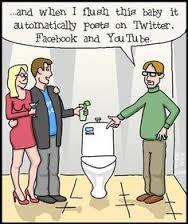 thinking that itís much more difficult to get people
to give you permission to email them as opposed to get them to become a
fan on Facebook or become a follower on Twitter. thinking that itís much more difficult to get people
to give you permission to email them as opposed to get them to become a
fan on Facebook or become a follower on Twitter.
But thatís not
the case.
Derek Halpern did
a second test to see which would be harder: getting people to subscribe
to his email list, or getting people to follow him on Twitter. You would
naturally think people are more likely to click a follow button on Twitter
than give up their
email address.
But you would be mistaken.
In his
experiment, Derek sent 1,000 visitors to his email opt-in page, and 1,000
visitors to his Twitter page. The results? He received almost 500 new
email subscribers, making it a conversion rate of almost 50%. The number of Twitter followers he
gained: less than 100!
It all boils
down to these three words: return on investment.
Letís open this
portion with a killer statistic - the Direct
Marketing Association found that email marketing has a ROI of 4300%.
Monetateís Ecommerce
Quarterly also showed that email drove more conversions than other
marketing channels, including search and social.
| Search
Engines |
1.96% |
2.49% |
1.95% |
| Social Media |
0.73% |
0.88% |
0.71% |
| Email
Marketing |
3.48% |
3.58% |
3.19% |
While the above
chart promotes email
marketing as the winner, I donít believe there should be a winner.
Email Marketing and Social
Media Marketing are two types of mediums with very different opportunities.
So here's the
bottom line, sports fans.....
So-called
"old-school" email
marketing is
a push medium where a
marketer can send a message to a recipient
when theyíd like to. Social is a pull medium where you put the
message out and hope that someone reads and responds.
Think about it
this way: You go into a new car lot to purchase a car. One
(old-school) salesman comes out to the lot to greet you, assist you, and
answer any questions. (This is "push marketing")
Another salesman just sits in his office waiting for YOU to come to
HIM. (This is "pull marketing")
Which salesman do
you think will make more money?
Hitting
someone in the nose with a brick may be "old-school".....
.....but it
DOES get their attention!
With
the Big Dogs program, we take great pride in presenting you with an
unparalleled opportunity. It's an unparalleled opportunity to have a
staggering number of qualified prospects handed to you on a monthly basis, and
to acquire an above average income that comes to you on an on-going,
recurring basis! unparalleled opportunity to have a
staggering number of qualified prospects handed to you on a monthly basis, and
to acquire an above average income that comes to you on an on-going,
recurring basis!
All
YOU have to do is to reach out and grab hold of the comet's tail.
Otherwise.....
"Step
aside and let the BIG Dogs eat!"
  (And
if you don't ALREADY have your copy of "Secrets of the Big Dogs" (And
if you don't ALREADY have your copy of "Secrets of the Big Dogs"
you can pick it up at the link directly below:)
http://BigDogSecrets.com
Proceed
To Article 2
Return to Contents
|
 1 | Facebook 1.6 billion
registered users - 1.35 billion active users
1 | Facebook 1.6 billion
registered users - 1.35 billion active users 2 | Twitter 500 million
registered users - 284 million active users
2 | Twitter 500 million
registered users - 284 million active users 3 | Google Plus+ 1 billion
registered users - 540 million active users
3 | Google Plus+ 1 billion
registered users - 540 million active users 4 | Instagram 300 million
registered users - 200 million active users
4 | Instagram 300 million
registered users - 200 million active users


 Is Email Marketing.....
Is Email Marketing.....




 willy-nilly.
willy-nilly. A recent study concluded
that email is almost 40 times better at acquiring new customers
than Facebook and Twitter. (Source: McKinsey
& Company)
A recent study concluded
that email is almost 40 times better at acquiring new customers
than Facebook and Twitter. (Source: McKinsey
& Company) mailbox
- their inner electronic sanctum.
Thatís very different from sending out a tweet or posting something on
Facebook, where they may or may not see it, because itís just part of a
much larger timeline featuring hundreds of other people.
mailbox
- their inner electronic sanctum.
Thatís very different from sending out a tweet or posting something on
Facebook, where they may or may not see it, because itís just part of a
much larger timeline featuring hundreds of other people. For every $1
spent on email marketing, the average return is $44.25. (Source: emailexpert)
For every $1
spent on email marketing, the average return is $44.25. (Source: emailexpert) thinking that itís much more difficult to get people
to give you permission to email them as opposed to get them to become a
fan on Facebook or become a follower on Twitter.
thinking that itís much more difficult to get people
to give you permission to email them as opposed to get them to become a
fan on Facebook or become a follower on Twitter. unparalleled opportunity to have a
staggering number of qualified prospects handed to you on a monthly basis, and
to acquire an above average income that comes to you on an on-going,
recurring basis!
unparalleled opportunity to have a
staggering number of qualified prospects handed to you on a monthly basis, and
to acquire an above average income that comes to you on an on-going,
recurring basis!
